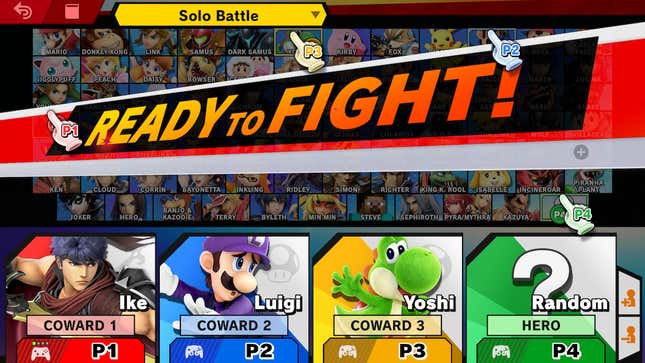
Last week, publisher GameMill Entertainment unveiled Nickelodeon All-Star Brawl, a fighting game featuring iconic Nickelodeon characters like SpongeBob SquarePants, Nigel Thornberry, and that one dude with the toast-shaped face. Between the memes, you might see prospective players debate who’d be the strongest fighter (Patrick Star, obviously) and who they plan on maining (also Patrick Star), even this far out from release. I say such debate is needless.
The right answer is no answer at all.
Read More: Nickelodeon Fighting Game Devs Have High Hopes, Competitive Dreams
All-Star Brawl sounds and looks like a legit Smash clone, one with potentially better online functionality than Nintendo’s fighting game. If you, playing as a randomly selected All Stars character, go up against someone fighting as their “main”—a.k.a., the person they’re most accustomed to playing as—you’ve instantly inured yourself to loss. Choosing random also telegraphs a level of self-assuredness only present in players who really know their shit.
Sure, you might technically “lose” a particular match after choosing a random fighter, but you can always chalk that loss up to an imbalanced match-up. Maybe the fickle whims of fate assign you a fighter you’ve mastered. More likely, they’ve stuck you with one you’re woefully unfamiliar with—or have never played before. C’mon, how is that a balanced measure of skill? The game was an uneven playing field; the scales were tipped against you from the jump.
Meanwhile, winning means you get to say you’ve nabbed glory against the odds. Your opponent had the pick of the whole lot, selected the fighter they’re (probably) best at, and still lost—against someone who had no say in the matter as to who they fought as.
In other words, it’s a win-win scenario, at least for you, chooser of “random.”
I’ve learned this lesson the hard way, mostly via five iterations and hundreds if not thousands of hours of Super Smash Bros., Nintendo’s long-running platform fighting game. One guy in our Smash group considers it a point of personal pride to be an effective brawler with every character on the roster. When we meet other Smash players at bars or parties, this will inevitably come up.
“Who’s your main?” people will ask.
“No one,” he’ll say with the dead-eyed confidence of someone who knows he’ll win. “Everyone,” he’ll add with a shrug. “Random.”
It’s maddening.
Periodically, while we’re choosing fighters, he’ll move his cursor over to the “random” tile. Everyone will then sigh and move their cursors over, too. To do otherwise would result in us decried as cowards. Any wins don’t really count. Any losses count double. We know the rules.
On the flip side, playing under such conditions has been a years-long boot camp that’s honed me into a far better player than I’d be if I stuck with Yoshi or Roy or the L-Man for every match. Look, I’m not gonna stand on some pedestal and claim I’m now great—or even merely good—with every single Smash fighter. But, at this point, I’m passably decent with the 912-character roster of Super Smash Bros. Ultimate. Basically, if you and I both squared off and chose our “best” fighters, you might win. But if we both agreed to let the game choose for us? Well, that’s another story.
Wanna put money on it?